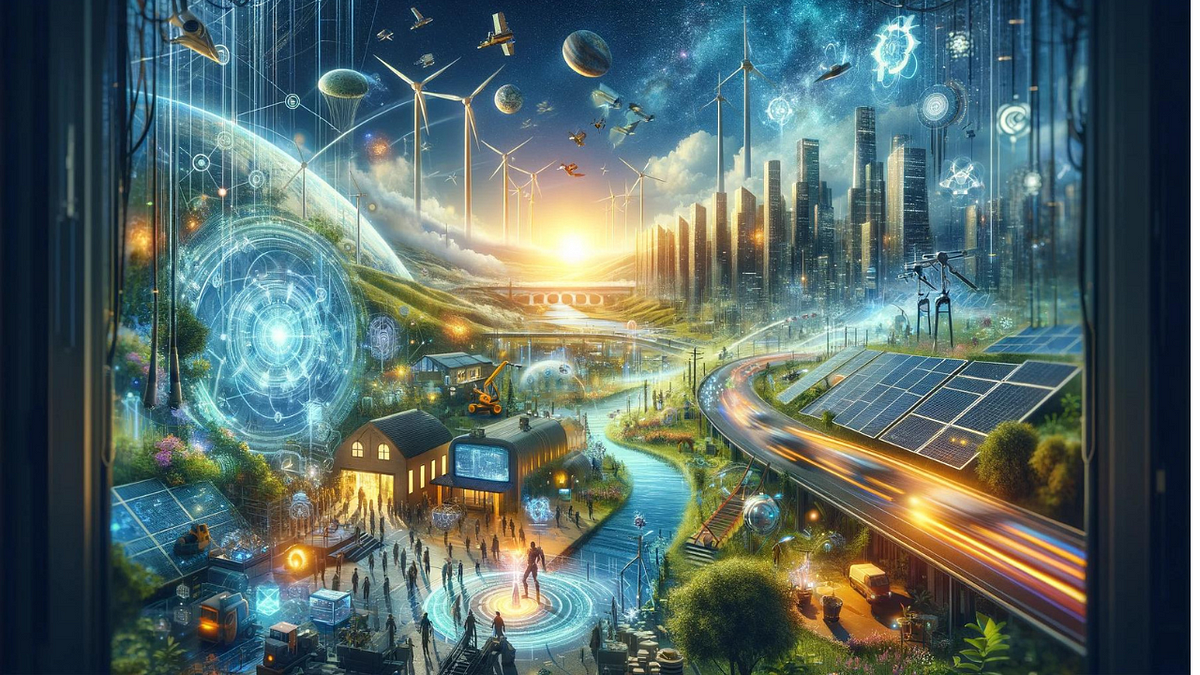## Introduction to emerging technology innovations
As we enter the modern era, it is impossible to ignore the profound impact emerging technology innovations are having on our world. From Artificial Intelligence (AI) to the Internet of Things (IoT), Blockchain to Virtual Reality (VR) and Augmented Reality (AR), and Robotics to Biotechnology, the possibilities seem endless. In this article, I will explore how these emerging technology innovations are shaping different industries and revolutionizing our everyday lives.
The rapid advancement of technology is revolutionizing industries across the board. From healthcare to transport, finance to education, no sector is left untouched. One of the most important impacts can be seen in the field of Artificial Intelligence (AI). AI has the potential to transform industries by automating processes, improving efficiency and enabling more accurate decision-making. For example, in healthcare, AI-powered diagnostic tools can analyze medical images and help doctors diagnose diseases with higher accuracy and speed.
Another emerging technology innovation making headlines is the Internet of Things (IoT). IoT allows everyday objects to be connected to the Internet, enabling them to collect and exchange data. This connection opens up a whole new world of possibilities, from smart homes to smart cities. In the transportation industry, IoT is used to monitor and optimize traffic flow, resulting in reduced congestion and improved safety.
Artificial intelligence (AI) has become a buzzword in recent years, and for good reason. AI refers to the development of computer systems that can perform tasks that would typically require human intelligence. From machine learning algorithms to natural language processing, AI is applied in various fields. In healthcare, AI is used to develop personalized treatment plans, predict disease outbreaks and analyze large data sets to identify trends and patterns. In finance, AI algorithms are used for automated trading, fraud detection and risk assessment.
Additionally, AI has also found its way into customer service. Chatbots powered by AI can communicate with customers, answer their queries and provide assistance without the need for human intervention. This not only saves time and resources, but also improves customer satisfaction. The potential applications of AI are vast and continue to grow as technology advances.
The Internet of Things (IoT) is a network of interconnected devices that communicate with each other and exchange data. This network includes everyday objects such as smartphones, household appliances, vehicles and even wearable devices. The implications of IoT are far-reaching. For example, smart homes can be equipped with sensors that monitor energy consumption, adjust temperature settings and even detect potential security breaches. This not only increases comfort, but also promotes energy efficiency and home safety.
In the industrial sector, IoT is changing the way factories operate. Connected sensors can monitor production lines in real time, allowing for predictive maintenance and reducing downtime. Supply chain management is also being transformed by IoT, enabling businesses to track inventory, optimize logistics and reduce costs. With the increasing adoption of IoT, our world is becoming more interconnected than ever before.
Originally developed for cryptocurrencies such as Bitcoin, blockchain technology has now evolved beyond its initial application. Blockchain is a decentralized and transparent system that enables secure and tamper-free transactions. Its potential applications extend beyond finance and are being explored in various industries.
One of the key areas where blockchain is making an impact is supply chain management. By recording transactions on a shared ledger, blockchain ensures transparency and traceability, reducing the risk of fraud and counterfeiting. In the healthcare industry, blockchain is used to securely store and share patient records, enabling seamless access to medical history across different healthcare providers. The potential of blockchain technology is immense, and its adoption is expected to grow in the coming years.
Virtual Reality (VR) and Augmented Reality (AR) are changing the way we experience the world around us. VR immerses users in a simulated environment, while AR overlays digital information on the real world. These technologies are not limited to entertainment but find applications in various fields.
In the field of education, VR and AR are changing the way students learn. By providing immersive experiences, VR can transport students to historical events, distant planets or even inside the human body. AR, on the other hand, can enhance traditional textbooks by overlaying interactive 3D models and animations. This makes learning more engaging and interactive, leading to better retention of information.
Robots and automation have been part of industrial processes for decades, but recent advances are taking it to new heights. From manufacturing to healthcare, robots are becoming more versatile and capable of performing complex tasks. In manufacturing, robots are used for assembly, quality control and even warehouse management. This improves efficiency, reduces errors and frees up human workers for more creative and strategic roles.
In the healthcare industry, robots help surgeons perform complex procedures with greater precision. They can also be used for patient care, such as delivering medication or assisting with rehabilitation. While the integration of robotics and automation into the workforce may raise concerns about job displacement, it also opens up new opportunities and enables people to focus on tasks that require critical thinking and emotional intelligence.
Advances in biotechnology are changing healthcare in ways we could never have imagined. From gene editing to personalized medicine, biotechnology is pushing the boundaries of what is possible in medical science. Gene editing technologies such as CRISPR-Cas9 have the potential to cure genetic diseases by altering the DNA of living organisms. This opens up possibilities for the treatment of conditions that were previously considered untreatable.
Personalized medicine, on the other hand, tailors medical treatments to an individual’s genetic makeup, lifestyle and environment. By analyzing an individual’s genetic information, doctors can prescribe the most effective treatment with minimal side effects. This not only improves patient outcomes, but also reduces healthcare costs by minimizing trial and error approaches.
While the potential of emerging technology innovations is exciting, it is crucial to address the ethical considerations and challenges that come with them. For example, privacy and data security are major concerns in a world where data is constantly being collected and analyzed. The ethical use of AI and the potential for biased algorithms must also be carefully considered to prevent discrimination and inequality.
In addition, there are concerns about job displacement due to automation and robotics. As technology advances, certain jobs may become obsolete, leading to unemployment and social inequality. It is essential to invest in retraining programs and create a supportive environment for workers to adapt to the changing landscape.
The future of emerging technology innovations is limitless. As technology continues to advance at an unprecedented rate, we can expect even more groundbreaking developments in the coming years. From advances in AI that enable machines to learn and reason like humans, to the integration of IoT into every aspect of our lives, the possibilities are endless.
Moreover, the convergence of different emerging technologies holds great promise. For example, the combination of AI and IoT could lead to the development of smart cities where everything from transportation to energy management is optimized for efficiency and sustainability. The integration of VR and AR with robotics could revolutionize industries such as manufacturing, healthcare and education.
Finally, emerging technology innovations are transforming our world in ways we could never have imagined. From AI to IoT, Blockchain to VR and AR, and robotics to biotechnology, the possibilities are endless. These technologies are revolutionizing industries, improving efficiency and improving our everyday lives. However, it is crucial to address the ethical considerations and challenges that accompany these advances.
As we look to the future, it is imperative to embrace emerging technology innovations and harness their potential for the greater good. By investing in research, fostering collaboration and ensuring ethical practices, we can shape a future where technology serves as a tool for positive change. So let’s embrace the future and reveal the endless possibilities that lie ahead.
To stay up to date with the latest advancements in emerging technology innovations, subscribe to our newsletter and join the conversation on our social media platforms. Let’s explore the future together and shape the world we want to live in.
Disclaimer for Uncirculars, with a Touch of Personality:
While we love diving into the exciting world of crypto here at Uncirculars, remember that this post, and all our content, is purely for your information and exploration. Think of it as your crypto compass, pointing you in the right direction to do your own research and make informed decisions.
No legal, tax, investment, or financial advice should be inferred from these pixels. We’re not fortune tellers or stockbrokers, just passionate crypto enthusiasts sharing our knowledge.
And just like that rollercoaster ride in your favorite DeFi protocol, past performance isn’t a guarantee of future thrills. The value of crypto assets can be as unpredictable as a moon landing, so buckle up and do your due diligence before taking the plunge.
Ultimately, any crypto adventure you embark on is yours alone. We’re just happy to be your crypto companion, cheering you on from the sidelines (and maybe sharing some snacks along the way). So research, explore, and remember, with a little knowledge and a lot of curiosity, you can navigate the crypto cosmos like a pro!
UnCirculars – Cutting through the noise, delivering unbiased crypto news















